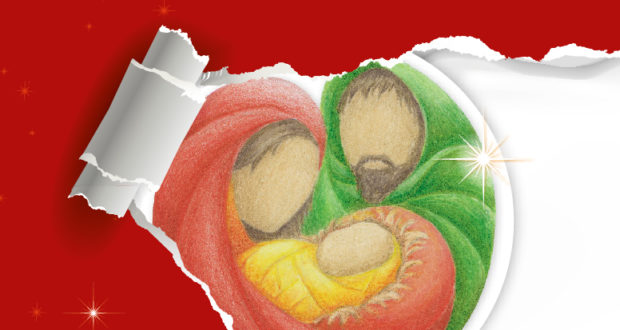While a great deal of society tends to focus on material “wants” at Christmas, Trinity College Queensland’s Dean of Formations and Dispersed Learning Rev Nigel Rogers uncovers the relational “needs” at the core of the Christmas narrative, and how God holds the key to a flourishing, abundant life.
“Oh, wow, a T-shirt! That’s awesome, thanks so much,” I said as I caught the gift that old mate threw me from under the Christmas tree.
Of course, I was grateful for the present, but I also had to laugh a little at the typically dodgy gift-giving that old mate was renowned for. Perhaps it was the fact that the T-shirt was two sizes too big. Maybe it was the genuine preloved look and smell that left me wondering if old mate had got a couple of wears out of it before giving it to me. It could also have been the mildly offensive graphic emblazoned across the front of the apparel. Seeing my slight amusement toward the gift old mate just shrugged his shoulders and smiled. I couldn’t help but smile in return and say, “Thanks mate!”
I was thankful for the T-shirt but I was more grateful for the fact that old mate was actually in the room to give me the present. I hadn’t seen him for a few Christmases and to look across the room at his smiling face evoked a wonderful revelation of how important the gift of relationship is. I didn’t realise how much I missed him until I held that shocker of a gift in my hand.
Life is all about relationships. Individualism is merely a hiding place from our deep need and desire for relationship. Christmas is one of those occasions where the revelation of the importance and state of relationships is laid bare. Giving gifts is one of the main ways that this revelation happens.
When we relate with someone deeply we know what they like, their preference for things and what they need. To give someone a gift that reflects this can penetrate deep into their life with the revelation that they genuinely matter. This is where the wonder of a relationship is found. How wonderful it is to love and be loved, to be known and to know another, to belong to someone else and not have to prove our worth to them. We all long for this because we were made for it. Nothing brings wonder to our life like living deeply with another. Why? Perhaps wrapping paper can point us toward an answer.
The T-shirt old mate gave me was not wrapped, none of his gifts ever are. But when we get a gift from under the Christmas tree that is wrapped we are lured into this sense of wonder as to what it might be.
We can turn the gift over in our hands, give it a shake, feel the shape of it and try and sum up what it is. That moment of wonder found in the anticipation and revelation of what lies beneath the wrapping paper is priceless and so enjoyable.
Anticipation and revelation
Such a moment of wonder is exponentially magnified in the anticipation that had gripped the people of God as they awaited the coming of the Messiah. In the exchange between the shepherds and the angels we hear that the anticipation is now met with God’s revelation as it is declared, “I am bringing you good news of great joy for all people: to you is born this day in the city of David
a Saviour, who is the Messiah, the Lord.”
(Luke 2:10,11).
It is profoundly amazing and wonder-inducing that God made himself known by taking on flesh. The wonder of it all is that God did this so that he could live deeply with people for the sake of revealing his love and life. In reflecting on this good news of the angels to the shepherds theologian Karl Barth suggested, “Here we have a Lord in direct relationship to our real existence. That is and that means God’s revelation. This is the meaning of the shepherds’ words about the newborn child who is Christ the Lord. At those things all wondered.”1
However, some anticipated a Messiah for the people of God rather than a Messiah of God. The distinction is sharp and contrasting. Perhaps this provides a degree of explanation as to why Jesus was reticent to take the title of Messiah during his ministry years.
He was not the “anointed one” of God’s chosen people, sent by God to serve the liberation agenda of Israel. Such an anticipation is somewhat understandable but misguided. It is why the revelation of God’s program, in and through Jesus’ ministry, is so profound and unexpected.
Nowhere is this more striking than in the resurrection of Jesus at which point he definitively assumes the title of Messiah, the Christ. Here, in exchanges such as on the road to Emmaus (Luke 24:26) Jesus proclaims that he is the Christ, the “anointed one”, the Messiah of God who is the fulfillment of Old Testament hope.
Yet, more than this the Christ is the gracious starting point by which all people can be drawn into God’s life. The wonder of this revelation is that all humanity, not just the people of Israel are swept up in the salvation plan inaugurated by Jesus the Christ.
It is in and through Jesus Christ that the fullness and newness of a flourishing life is lived in relationship with God. We might poorly anticipate any number of ways that God would treat us if he really knew what we are like. This anticipation is equally as misguided as those in Israel who expected the Messiah to serve their salvation program.
The good news
It is the revelation of God in Jesus the Christ that disrupts our anticipations with the truth that when the angels declared that the good news was for all people, that includes each one of us.
The good news is that God has so much more in store for your life than you could ever manufacture and produce by yourself. Are you open to even considering this truth? Perhaps you are too intent on denying the revelation of God because of what it might mean for your life? I can certainly attest to spending many years keeping God at arm’s length for this very reason.
The wonder of God’s gift, which we are reminded of each Christmas, is that it is not material but relational. God wants a relationship with you, he hasn’t hidden his intention for this. The wonder of this can never be extinguished.
We can get lost in our own unworthiness or litany of wrongs, in making a case as to why we are beyond God’s unconditional love for us, but we would be wrong to do so. If merit were the basis for God’s love, then it would be neither unconditional nor able to reach anyone. Furthermore, if status and achievement was the basis for God drawing near to anyone then why would God send angels to shepherds to herald the good news of Jesus’ birth (Luke 2:8-15)?
We sing about this every year in Christmas carols, yet the shepherds were one of the lowliest, least considered groups of people in Israel. Why would God entrust them with proclaiming to others that the Messiah had come (Luke 2:17,18)? The wonder of God is that he seeks to draw all people into his life, no matter what their status, identity or achievements.
Wants versus needs
God isn’t as interested in your material “wants” nearly as much as he is in your relational “needs”. This is a handy revelation at Christmas time when much of our cultural bias is tipped in the opposite direction.
Christmas marks the beginning of a specific season in God’s life as, in Jesus, God became both fully divine and fully human. The hypostasis of the incarnation of God ensures that what began at Christmas was a revelation that allows all people to not merely know about God but to actually know the substantive nature, character and activity of God amongst humanity.
In Jesus, God penetrated the lives of people. He lived deeply with others and in the same way seeks to live deeply with us. The wonder of living deeply with God and others is that it is the key, the secret to a flourishing, abundant life. This Christmas, if you find yourself wondering what it is all about then remember the words of Jesus: “I came that they may have life, and have it abundantly” (John 10:10).
May you have a flourishing, wonder-filled Christmas!
 JourneyOnline
JourneyOnline







